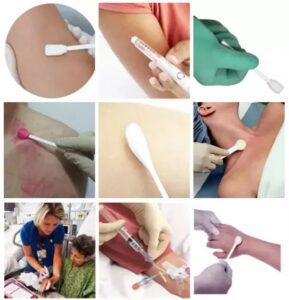Infection prevention is a crucial aspect of healthcare, and it requires the use of effective disinfectants. One of the most widely used disinfectants is chlorhexidine gluconate, which is often found in swab form. Chlorhexidine gluconate swabs are a popular choice for healthcare providers due to their effectiveness in preventing infections.

Chlorhexidine gluconate is a broad-spectrum antimicrobial agent that works by disrupting the cell membrane of microorganisms, ultimately leading to their death. It is effective against a wide range of bacteria, viruses, and fungi, including those that are resistant to other disinfectants.
Chlorhexidine gluconate swabs are commonly used for skin preparation before surgery or invasive procedures. They are also used to clean and disinfect wounds, catheter insertion sites, and other areas of the body where infection is a concern. Chlorhexidine gluconate swabs are easy to use, and they come in convenient, single-use packaging, which helps to prevent cross-contamination.
One of the advantages of chlorhexidine swabs is that they provide long-lasting protection against infection. The antimicrobial properties of chlorhexidine gluconate can remain active on the skin for up to 48 hours after application, providing a prolonged period of protection against infection.
Chlorhexidine swabs are also well-tolerated by patients, with few reported side effects. However, some individuals may experience skin irritation or allergic reactions, so it is important to test for sensitivity before using chlorhexidine gluconate swabs.
In conclusion, chlorhexidine gluconate swabs are an effective solution for infection prevention in healthcare settings. They are easy to use, provide long-lasting protection, and are well-tolerated by patients. Healthcare providers should consider incorporating chlorhexidine gluconate swabs into their infection prevention protocols to help reduce the risk of healthcare-associated infections.

















